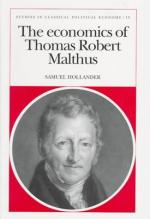|
This section contains 690 words (approx. 3 pages at 300 words per page) |

|
1766-1834
English Economist
Thomas Malthus was one of the most important English economic theorists of the early nineteenth century. He is best known for his influential work, An Essay on the Principle of Population, first published anonymously in 1798, but reissued in six editions by 1826. Malthus further developed the laissez-faire (French for "let things alone") views of economist Adam Smith (1723-1790), who promoted the capitalist principles of self-interest and free competition in the marketplace. Malthus's book proved valuable for Charles Darwin (1809-1882) as he began to formulate his concept of natural selection through the struggle for existence. Though Malthus's population principle has been largely discredited, fears of overpopulation periodically stir new interest in his ideas.
Malthus studied at Cambridge University, graduating with honors in math. Thereafter Malthus joined the Anglican clergy and became priest over a parish in Surrey in 1796. His book on population brought...
|
This section contains 690 words (approx. 3 pages at 300 words per page) |

|


